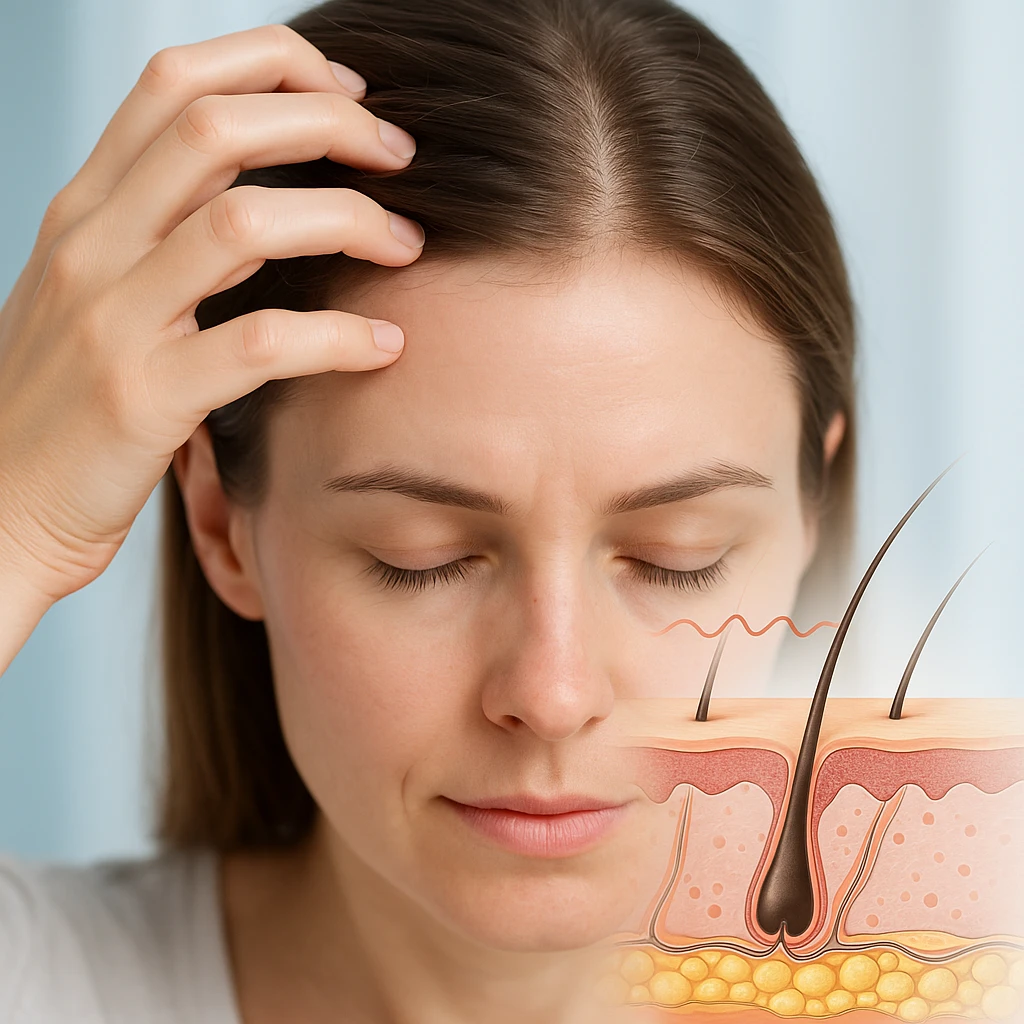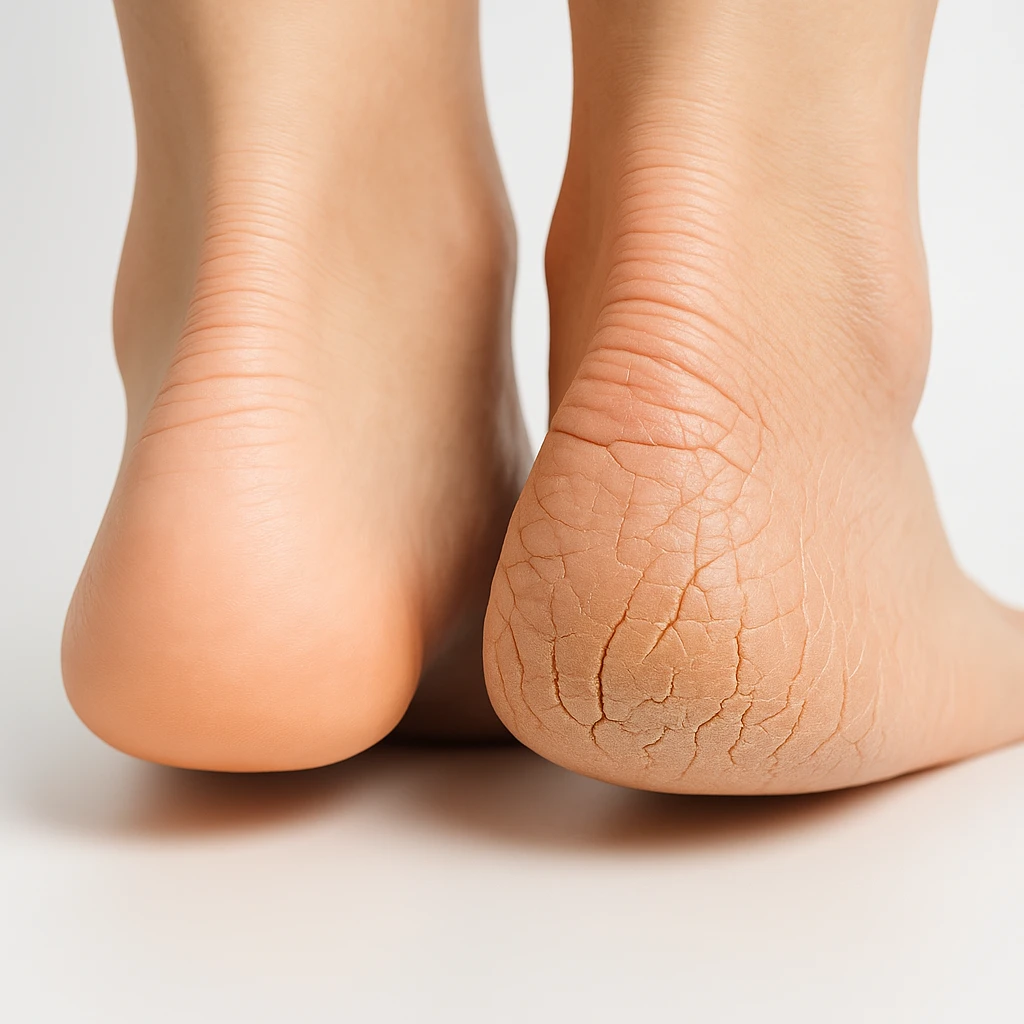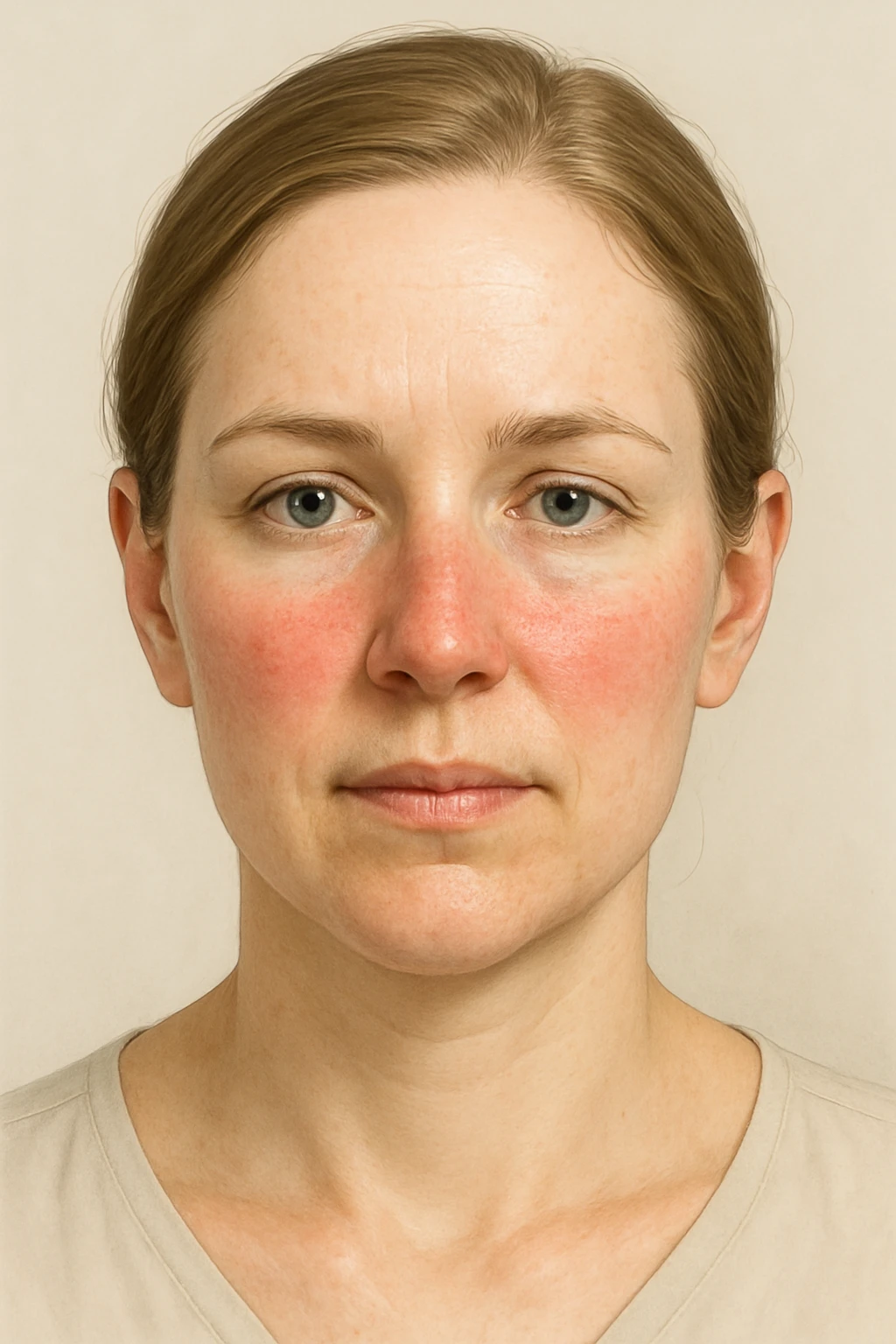When Scalp Itching Signals a Skin or Health Condition
Scalp Itching and Its Impact
What Is Scalp Itching?
Scalp itching, also called scalp pruritus, describes the uncomfortable urge to scratch the skin on the scalp. It is a symptom rather than a disease and can result from a variety of underlying causes involving the skin, nerves, or internal systems. The scalp contains a high density of hair follicles, sebaceous glands, and sensory nerves, making it especially sensitive to irritation and inflammation. Even small disturbances to the scalp’s protective barrier or balance can lead to itching.
The sensation of itch originates from both the skin and the nervous system. Nerves in the scalp detect irritation or chemical mediators and send signals to the brain, which interprets them as itch. This connection between the skin and the nervous system helps explain why scalp itching may persist even when no visible rash is present.
How Common Is It?
Scalp itching is among the most common dermatologic complaints. Research indicates that between 13% and 45% of people experience scalp itch at some point, though prevalence varies depending on population and study methods. One large clinical study found that about 6.9% of adults reported persistent scalp itch, with women affected slightly more often than men. These data show that scalp itching is widespread and can occur at any age.
- Estimated prevalence ranges from 13% to 45% across studies.
- Approximately 6.9% of adults report ongoing scalp itching.
- Women are slightly more affected than men.
- The condition can occur at any age.
Because many people self-manage mild scalp itching without medical consultation, the true prevalence may be even higher. The condition often appears alongside other scalp problems such as dandruff or dryness, making diagnosis more complex.
Why It Matters
Although scalp itching might seem minor, it can meaningfully affect daily life. Persistent itch can disrupt concentration, interfere with sleep, and cause embarrassment-especially when visible flaking or scratching occurs. Chronic scratching may also damage the scalp’s surface, leading to soreness or secondary infection.
- Disrupts focus and sleep quality.
- Can cause embarrassment or social discomfort.
- Frequent scratching increases infection risk.
Understanding that scalp itching is common and treatable encourages individuals to seek timely care and reduces unnecessary concern.
Causes of Scalp Itching
Dermatologic Causes
Most cases of scalp itching arise from conditions that affect the scalp’s surface. Seborrheic dermatitis is one of the most common causes, producing flaking, redness, and irritation linked to inflammation and yeast overgrowth. It accounts for nearly half of scalp itching cases seen in dermatology settings. Other common dermatologic causes include psoriasis, fungal infections such as tinea capitis, and head lice infestations.
- Seborrheic dermatitis: causes flaking, redness, and irritation associated with yeast overgrowth.
- Psoriasis: produces thick, scaly patches extending beyond the hairline.
- Tinea capitis (ringworm): fungal infection causing scaling, tenderness, and hair breakage.
- Head lice: parasitic infestation causing intense itching due to reaction to lice saliva.
Irritant and Allergic Causes
Not all scalp itching results from disease. Hair products such as shampoos, dyes, or sprays can trigger irritation or allergic reactions known as contact dermatitis. This occurs when ingredients disrupt the scalp’s barrier or the immune system reacts to a chemical. Symptoms may appear suddenly after a new product or develop gradually with repeated exposure.
- Triggered by dyes, fragrances, or preservatives in hair care products.
- Can appear after new product use or cumulative exposure.
- Common symptoms include burning, tightness, or mild redness.
These irritant or allergic reactions usually improve once the trigger is removed. Because the surrounding skin often appears normal, noting timing and product use patterns helps identify the cause.
Beyond the Skin
Scalp itching may also stem from internal or neurological factors. Neuropathic scalp itch occurs when nerves transmitting itch signals become overactive or damaged. Systemic diseases such as liver or kidney disorders can also lead to generalized itching involving the scalp. Psychological factors, including stress or anxiety, can intensify the sensation of itch, while some individuals experience a sensitive scalp that reacts strongly to normal stimuli like temperature or hair care routines.
- Neuropathic causes: damaged or overactive nerves triggering scalp sensations.
- Systemic causes: internal conditions such as liver or kidney disease.
- Psychogenic causes: stress or anxiety that heighten perception of itch.
- Sensitive scalp: heightened reactivity to normal environmental stimuli.
Recognizing Symptoms and When to Seek Help
Typical Symptoms
Scalp itching symptoms range from mild irritation to persistent discomfort. Common signs include flaking, redness, scaling, and tightness. Flaking with itch is typically linked to dandruff or seborrheic dermatitis, with flakes often visible along the hairline or on clothing.
- Flaking and itching linked to dandruff or seborrheic dermatitis
- Redness, scaling, or minor scratches from rubbing
- Tightness or tenderness after harsh product use
- Worsening itch during stress or dry weather
Inflammatory scalp itching may show redness or small excoriations. Recognizing triggers such as dryness, product reactions, or weather changes helps differentiate mild irritation from conditions needing medical care.
When Symptoms Signal Something More
Sometimes, scalp itching indicates a deeper issue. Red or swollen areas, fluid-filled bumps, or hair loss can suggest infection or inflammation. The presence of lice or nits confirms infestation and requires prompt treatment. Persistent itching that resists gentle cleansing or over-the-counter remedies should be assessed by a healthcare provider.
Red Flags
| Symptom | Possible Concern |
|---|---|
| Pus-filled bumps or tenderness | Possible infection or folliculitis |
| Noticeable hair thinning or bald patches | Possible inflammatory or scarring scalp disorder |
| Visible lice or nits | Confirms parasitic infestation |
| Persistent itching despite self-care | Requires medical evaluation |
Diagnosis of Scalp Itching
Clinical Evaluation
When scalp itching persists without a clear cause, physicians perform a comprehensive evaluation. It begins with a review of medical history, including duration of itch, product use, medications, lifestyle, and related symptoms such as flaking, pain, or hair loss. This information helps determine whether the issue is dermatologic, allergic, or systemic.
- Review of symptom history: duration, triggers, and related factors
- Discussion of hair products, medications, and lifestyle changes
- Identification of associated signs such as flaking or hair loss
During examination, the scalp is inspected for redness, scaling, sores, or infection. Palpation reveals tenderness or swelling, while dermoscopy aids in detecting subtle lesions. Clinicians differentiate cases with visible lesions, such as dermatitis or infection, from those without, which may have neurologic or systemic origins.
Diagnostic Tests
If the clinical exam does not clarify the cause, diagnostic testing may follow. Skin scrapings or hair samples detect fungal or parasitic infections. Cultures identify bacterial causes. Blood tests evaluate systemic disorders such as thyroid, liver, or kidney disease. Patch tests or biopsies confirm allergic or inflammatory scalp conditions.
| Test Type | Purpose |
|---|---|
| Skin or hair sample | Detect fungal or parasitic infection |
| Culture swab | Identify bacterial infection |
| Blood tests | Check for thyroid, liver, or kidney disorders |
| Patch test or biopsy | Confirm allergic or inflammatory conditions |
These steps help tailor treatment so that therapy addresses the underlying cause rather than just the symptom. Medical evaluation is especially important when scalp itching worsens, persists, or occurs with hair loss or sores.
Treatment and Long-Term Relief for Scalp Itching
At-Home and Over-the-Counter Care
The first step in managing scalp itching often involves simple, consistent care at home. Gentle scalp hygiene supports a healthy skin barrier, while avoiding harsh shampoos, alcohol-based products, or frequent chemical treatments can reduce irritation. Identifying and removing potential aggravating factors-such as tight hairstyles, excessive heat styling, or fragranced hair products-is essential to minimize further discomfort.
- Use gentle, fragrance-free shampoos and avoid harsh cleansers.
- Limit heat styling and avoid tight hairstyles that strain the scalp.
- Rinse thoroughly to remove shampoo or conditioner residue.
- Stop using new hair products that appear to trigger irritation.
For mild dandruff or oily scalp conditions, over-the-counter medicated shampoos can provide effective relief. These formulations typically contain ingredients that control yeast growth, reduce oil buildup, or soothe inflammation. Regular use as directed can significantly reduce flaking and itching. If symptoms persist or return quickly, medical evaluation is recommended to identify underlying causes.
Medical Treatments
When scalp itching does not improve with proper home care, a dermatologist may prescribe targeted treatments. Common options include topical corticosteroids to reduce inflammation, antifungal creams or shampoos for fungal infections, and medicated solutions for allergic or inflammatory scalp conditions. In more severe or chronic cases, systemic medications may be necessary to control scalp pruritus.
| Treatment Type | Purpose |
|---|---|
| Topical corticosteroids | Reduce inflammation and itching |
| Antifungal creams or shampoos | Treat yeast or fungal infections |
| Systemic medications | Manage severe or chronic inflammatory causes |
| Non-pharmacologic topicals | Provide itch relief and improve quality of life |
Newer non-pharmacologic topical treatments have demonstrated promising results. In a clinical study, over 90% of participants experienced reduced itch and scratching within two weeks, and nearly nine in ten reported improved quality of life. These findings underscore how even short-term, well-directed therapy can produce meaningful relief when managed under medical supervision.
Chronic Management and Quality of Life
For individuals with recurring or unexplained scalp itching, long-term care focuses on maintaining scalp health and preventing flare-ups. Continued use of gentle hair care practices, stress management, and regular follow-up with healthcare professionals can help sustain comfort. Because chronic itching can affect confidence, sleep, and well-being, addressing both physical and emotional aspects of care is vital.
Effective management relieves discomfort while improving daily functioning and overall quality of life. With the right balance of self-care, medical treatment, and trigger awareness, most people can achieve lasting control over scalp itching and restore comfort in everyday life.
Questions to Ask Your Dermatologist
- What is the likely cause of my scalp itching?
- Which over-the-counter or prescription treatments are most suitable for my condition?
- How long should I use medicated shampoos or topical treatments?
- What changes can I make to help prevent flare-ups?
- When should I schedule a follow-up visit if symptoms continue?
Frequently Asked Questions About Scalp Itching
- Is scalp itching always caused by dandruff?
- No. While dandruff is common, scalp itching can also result from psoriasis, allergic reactions, fungal infections, or even nerve-related issues.
- Why does my scalp itch when there’s no visible rash?
- Itching without visible irritation may stem from nerve sensitivity, stress, or systemic conditions that affect how the skin and nerves communicate.
- Can frequent hair washing make scalp itching worse?
- Overwashing or using harsh shampoos can strip natural oils and irritate the scalp, while too little washing can allow oil and buildup to trigger itching.
- Does stress really make scalp itching worse?
- Yes. Emotional stress can heighten nerve activity and inflammation in the skin, intensifying the perception of itch.
- When should I see a dermatologist for scalp itching?
- Seek medical advice if itching persists for weeks, worsens, or is accompanied by hair loss, sores, swelling, or visible parasites like lice.
- Are home remedies effective for relieving scalp itching?
- Mild cases may improve with gentle cleansing and medicated shampoos, but persistent or severe itching usually requires professional diagnosis and treatment.
- Can scalp itching be linked to other health conditions?
- Yes. Disorders affecting the thyroid, liver, or kidneys can sometimes cause generalized itching that includes the scalp.
- How can I prevent flare-ups of chronic scalp itching?
- Use mild, fragrance-free hair products, avoid excessive heat styling, and manage stress to help maintain scalp balance and reduce irritation.
- Is scalp itching contagious?
- Most causes are not contagious, but infestations such as head lice or fungal infections can spread through direct contact or shared items.
- Does scratching make scalp itching worse?
- Repeated scratching can injure the scalp’s surface, leading to inflammation or infection and worsening the itch-scratch cycle.













